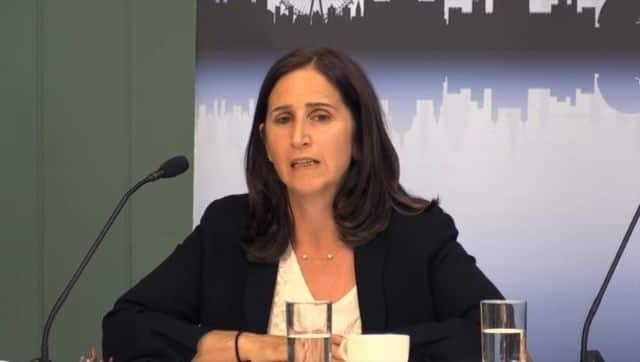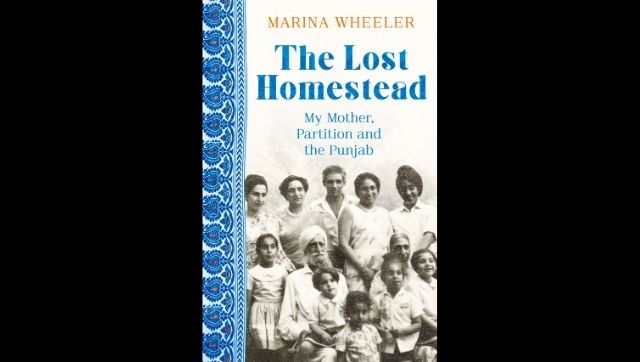Marina Wheeler, the daughter of a Sikh mother and an English father, embodies an Anglo-Indian identity that stands for a past caught in the trauma of partition and the Indian freedom movement and a present that continues to witness the tensions created by these political fissures. Out of this shared history of the partition and the first-hand accounts of her mother, Dip Singh, who fled a divided Punjab with her Sikh family, the author forms a striking narrative of histories, personal and political in her 2020 work, The Lost Homestead: My Mother, Partition and the Punjab_._ In 1947, when it was declared that India and Pakistan would be two separate nations, Singh’s family was among a million others who were forced to leave their land never to return. Singh left behind her beautiful home, the Sargodha Homestead in Civil Lines while her travels with her husband, the journalist Charles Wheeler, were to take her to Germany, the United States of America and finally to England. Using her story as the primary source for the nonfiction, the human rights lawyer and Queen’s Counsel crafts a meaningful prose that describes India’s struggle for political independence alongside her mother’s quest for her own freedom. The excerpt that follows talks about the events following the 1919 massacre at Jallianwallah Bagh in Amritsar, iterates the religious politics of Swaraj and assesses the animosity between the two great leaders of the time, Mahatma Gandhi and Muhammad Ali Jinnah. *** The massacre at Jallianwallah Bagh was a watershed moment. At Westminster, Churchill denounced it as a ‘monstrous event’. Dyer was relieved of his post and deprived of his pension. But he also had a band of vocal supporters. Many Englishmen and women who had served, or lived, in India, recalled the 1857 rebellion when Europeans were brutally butchered. To them, Dyer was the ‘Saviour of the Punjab’ and ‘Defender of the Empire’. A campaign by the Morning Post raised £26,000 for Dyer and he received a gilt sword. This well-publicised fact was, of course, deeply offensive to Indian opinion and rubbed salt in the wound. I ask Dip if she remembers Papa-ji ever speaking about the massacre when she was a child. She says she doesn’t. It is likely, given the dates, that by the time people became aware of the event – its scale and barbarity – Papa-ji would have left the Punjab for the Afghan military entanglement. When he returned, unlike many in Congress, he did not turn against the Raj. Dip says his own experience would have inclined him to see the event as an aberration that horrified most British as much as Indians. This, I discover later, on the centenary of the massacre, is a hotly disputed assessment, including among my own Indian family. Aberration or not, the massacre turbo-charged the nationalist cause and injected politics with a new radicalism. Gandhi took centre stage, promising Swaraj – freedom from foreign rule and self-reliance in manufactured goods. Across the country, imported cloth was hurled onto angry towering bonfires. Gandhi urged the production of home-spun cloth, known as khadi. This would revive the art of spinning, promote self-reflection and national self-respect, and rebuild India’s village economies. Khadi and the charkha (spinning wheel) became symbols of the nationalist campaign. That the energy and purpose of the Swaraj campaign attracted hundreds of thousands was familiar to me. I knew of elderly aunts – by marriage – who had been passionately involved, and who hosted Gandhi when he toured the country promoting Swaraj. But until recently I had not appreciated how deeply Gandhi’s vision for freedom and regeneration was infused with Hindu symbolism. Reviving the villages elevated the cause of cow protection. Gandhi was a committed vegetarian and his protest campaigns were accompanied by fasting and prayer. His speech was peppered with references to Hindu deities and heroes, among them Lords Ram and Krishna, and Shiva, the Destroyer. As Patrick French points out in Liberty or Death, the appeal to religion attracted people, including the illiterate, who had never been engaged in politics before. Gandhi turned Congress from a gentleman’s talking shop into a true populist movement. It mobilised the Hindu masses, but it had limited appeal to Muslims. Gandhi recognised that to win Swaraj and oppose the British effectively, Hindus and Muslims had to fight together. So he embraced a cause dear to the Muslim heart. As the Ottoman Empire crumbled, what, it was asked, would happen to the Caliphate? The defeated Turkish Sultans had been self-declared keepers of the Caliphate with control over the holy cities of Mecca and Medina and de facto leaders of the Islamic world. [caption id=“attachment_9101141” align=“alignnone” width=“640”]  Marina Wheeler’s new book tells the story of India’s struggle for political independence alongside her mother’s personal struggle for securing her own freedom. Screengrab from YouTube[/caption] The Khilafat movement urged the Great War’s victors, Britain and France, to preserve ‘the Caliphate’ intact. The movement was popular among Muslim peasants in the Salt Range, to the west of Sargodha. A group was lured to Afghanistan, but like returnees from Raqqa, former capital of the self-proclaimed Caliphate, the Islamic State of Iraq and the Levant (ISIL), they found reality less heavenly than the propaganda suggested. In any event, the movement imploded in 1924 when Kemal Ataturk, the founder of modern Turkey, abolished the Caliphate and ushered in a secular state. I found myself as surprised by Gandhi’s sponsorship of this cause as I was by Jinnah’s rejection of it. Jinnah never backed the Khilafat movement, I read; indeed, he condemned it as an ‘endorsement of religious zealotry’. In this period Jinnah was considered secular, but he may also have resented Gandhi’s using the cause to appeal directly to Muslims – people he claimed to represent. On the face of it, Gandhi and Jinnah had a good deal in common. They were both Gujarati British-educated lawyers from large prosperous families who wanted to see the back of the British. But from their first meeting their relationship was marked by a prickly animosity. And their approach to winning freedom differed. Jinnah argued the constitutionalist case. In his book, non-cooperation and burning European clothes were rabble-rousing and an incitement to anarchy. But he was out of tune with the mood of the time. At a critical Congress meeting in Nagpur, Gandhi’s call for non-cooperation was applauded and Jinnah was derided. He left the meeting and the Congress, dispirited and disappointed. Gandhi carried the delegates’ votes, but outside it was hard to keep passions under control. He called for peaceful resistance to British rule, but violence was never far from the surface. *** The above excerpt from Marina Wheeler’s The Lost Homestead: My Mother, Partition and the Punjab has been reproduced here with permission from Hodder & Stoughton/ Hachette India
Using her mother’s story as the primary source for the non fiction, the human rights lawyer and Queen’s Counsel crafts a meaningful prose that describes India’s struggle for political independence alongside her mother’s quest for her own freedom.
Advertisement
End of Article


)
)
)
)
)
)
)
)
)



